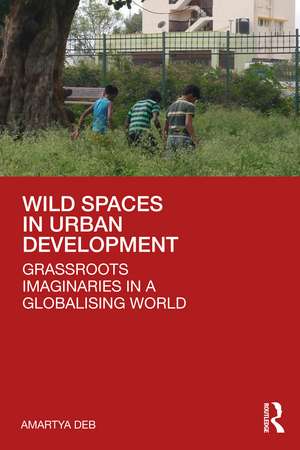Wild Spaces in Urban Development: Grassroots Imaginaries in a Globalising World
Autor Amartya Deben Limba Engleză Paperback – 8 sep 2023
Metropolitan cities are facing stark inequalities of green space distribution, hindering goals of sustainable development. But outside of human control, spontaneous nature grows in spaces that are neglected or are unaccounted for. Drawing on existing literature and primary research in a range of towns and cities, including Quito in Ecuador, Bengaluru and Kolkata in India, and Whitby in the United Kingdom, the book delves into the morphology, meanings, and values of those small-scale assemblages of wild growth which are typically overlooked. Discussing instead how such settings can be integrated into everyday urban life, the book offers a fresh perspective on issues around green infrastructure, heritage conservation, and environmental education, enabling cities worldwide to become more nature-positive.
A unique examination of an under-researched topic, this book will appeal to students, researchers, and professionals across landscape architecture, urban planning, urban ecology, and all related fields.
| Toate formatele și edițiile | Preț | Express |
|---|---|---|
| Paperback (1) | 301.88 lei 3-5 săpt. | +15.35 lei 6-12 zile |
| Taylor & Francis – 8 sep 2023 | 301.88 lei 3-5 săpt. | +15.35 lei 6-12 zile |
| Hardback (1) | 934.33 lei 3-5 săpt. | +18.43 lei 6-12 zile |
| Taylor & Francis – 8 sep 2023 | 934.33 lei 3-5 săpt. | +18.43 lei 6-12 zile |
Preț: 301.88 lei
Nou
Puncte Express: 453
Preț estimativ în valută:
57.77€ • 60.43$ • 47.99£
57.77€ • 60.43$ • 47.99£
Carte disponibilă
Livrare economică 13-27 martie
Livrare express 26 februarie-04 martie pentru 25.34 lei
Preluare comenzi: 021 569.72.76
Specificații
ISBN-13: 9781032449333
ISBN-10: 1032449330
Pagini: 222
Ilustrații: 1 Tables, black and white; 1 Line drawings, black and white; 48 Halftones, black and white; 49 Illustrations, black and white
Dimensiuni: 138 x 216 x 16 mm
Greutate: 0.26 kg
Ediția:1
Editura: Taylor & Francis
Colecția Routledge
Locul publicării:Oxford, United Kingdom
ISBN-10: 1032449330
Pagini: 222
Ilustrații: 1 Tables, black and white; 1 Line drawings, black and white; 48 Halftones, black and white; 49 Illustrations, black and white
Dimensiuni: 138 x 216 x 16 mm
Greutate: 0.26 kg
Ediția:1
Editura: Taylor & Francis
Colecția Routledge
Locul publicării:Oxford, United Kingdom
Public țintă
Postgraduate and Professional ReferenceCuprins
Prologue: The first sight of a cyborg assemblage 1. Morphology 2. Meanings 3. Existence 4. Aesthetics 5.Collectives 6. Coproduction 7. Frames 8. Imaginaries Epilogue: Situating wild spaces in urban nature and its governance
Notă biografică
Amartya Deb holds a Master of Arts in Cities and Global Development from the University of Sheffield, UK. His recent work based in India involved advising local governments on issues of sustainable urban development.
Recenzii
"In this wide-ranging study Amartya Deb brings a range of recent debates about marginal urban spaces to an Indian context. Deb’s street level ethnographic focus explores the complexities of urban nature from multiple vantage points."
Matthew Gandy, Professor of Geography, University of Cambridge, UK
'Amartya Deb’s Wild Spaces in Urban Development: Grassroots Imaginaries in a Globalising World, expands our understanding of urban nature by focusing on what he terms ‘landscape fractions’ – the microsites in cities where wild nature asserts itself and often flourishes. Drawing on extensive fieldwork, particularly in Kolkata and Bengaluru, Deb highlights how such small spaces teeming with plant life enhance the urban environment, especially for communities without parks or other designed green spaces. Not incidentally, these scattered and informal wild spaces sustain diverse animals – including wildlife such as birds, insects, and small mammals, as well as grazing cattle – allowing them to persist and thrive. Deb’s extraordinary work makes clear why we should tend, and protect these small yet vital spaces for wild nature.'
Jennifer Wolch, Dean Emerita, College of Environmental Design, University of California, Berkeley, USA
Matthew Gandy, Professor of Geography, University of Cambridge, UK
'Amartya Deb’s Wild Spaces in Urban Development: Grassroots Imaginaries in a Globalising World, expands our understanding of urban nature by focusing on what he terms ‘landscape fractions’ – the microsites in cities where wild nature asserts itself and often flourishes. Drawing on extensive fieldwork, particularly in Kolkata and Bengaluru, Deb highlights how such small spaces teeming with plant life enhance the urban environment, especially for communities without parks or other designed green spaces. Not incidentally, these scattered and informal wild spaces sustain diverse animals – including wildlife such as birds, insects, and small mammals, as well as grazing cattle – allowing them to persist and thrive. Deb’s extraordinary work makes clear why we should tend, and protect these small yet vital spaces for wild nature.'
Jennifer Wolch, Dean Emerita, College of Environmental Design, University of California, Berkeley, USA
Descriere
This fascinating book examines how microsites of spontaneous nature can reframe our understanding of the relationship between urban development and green space. It offers a fresh perspective on issues around green infrastructure, heritage conservation and environmental education, enabling cities worldwide to become more nature-positive.
